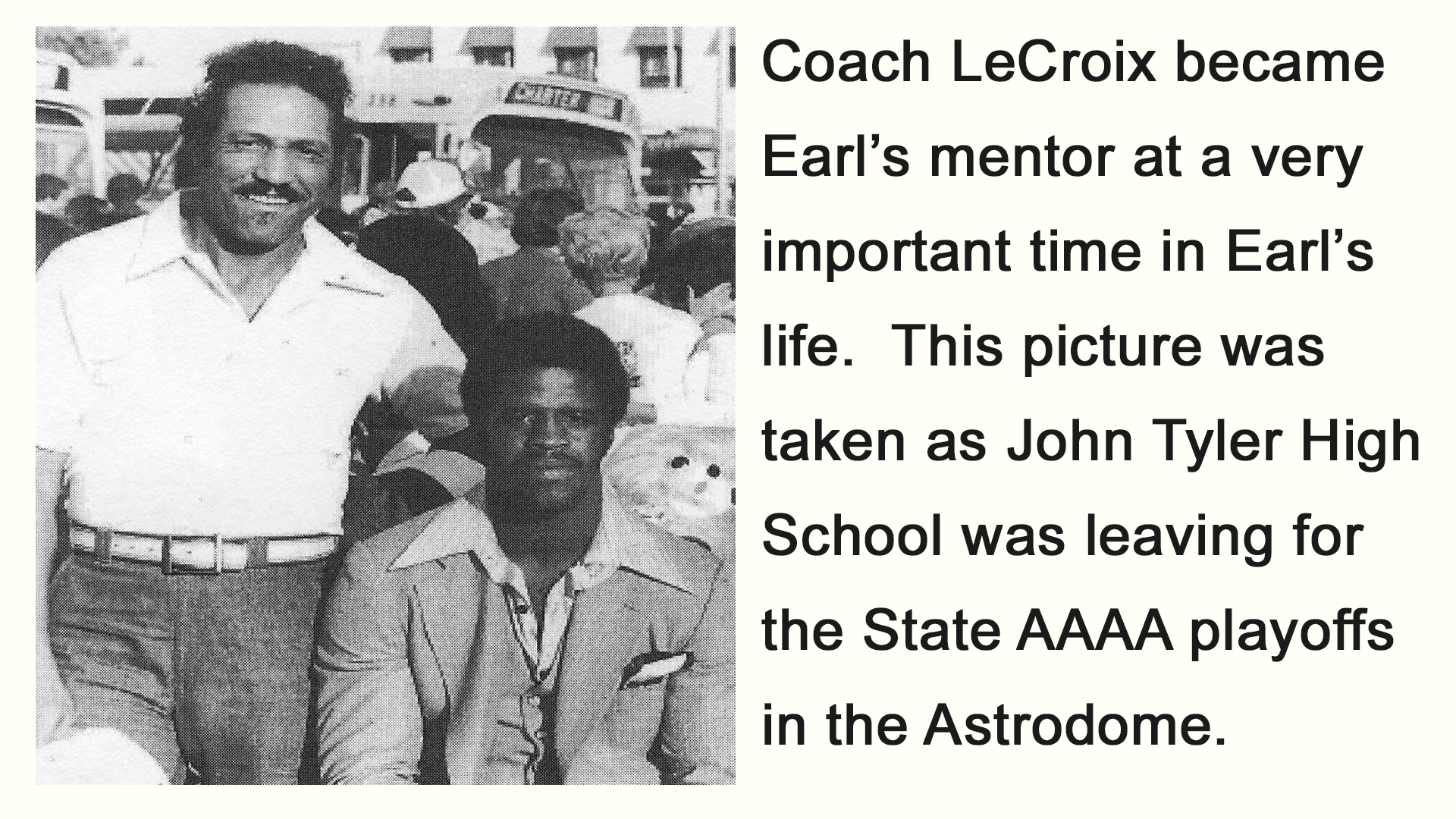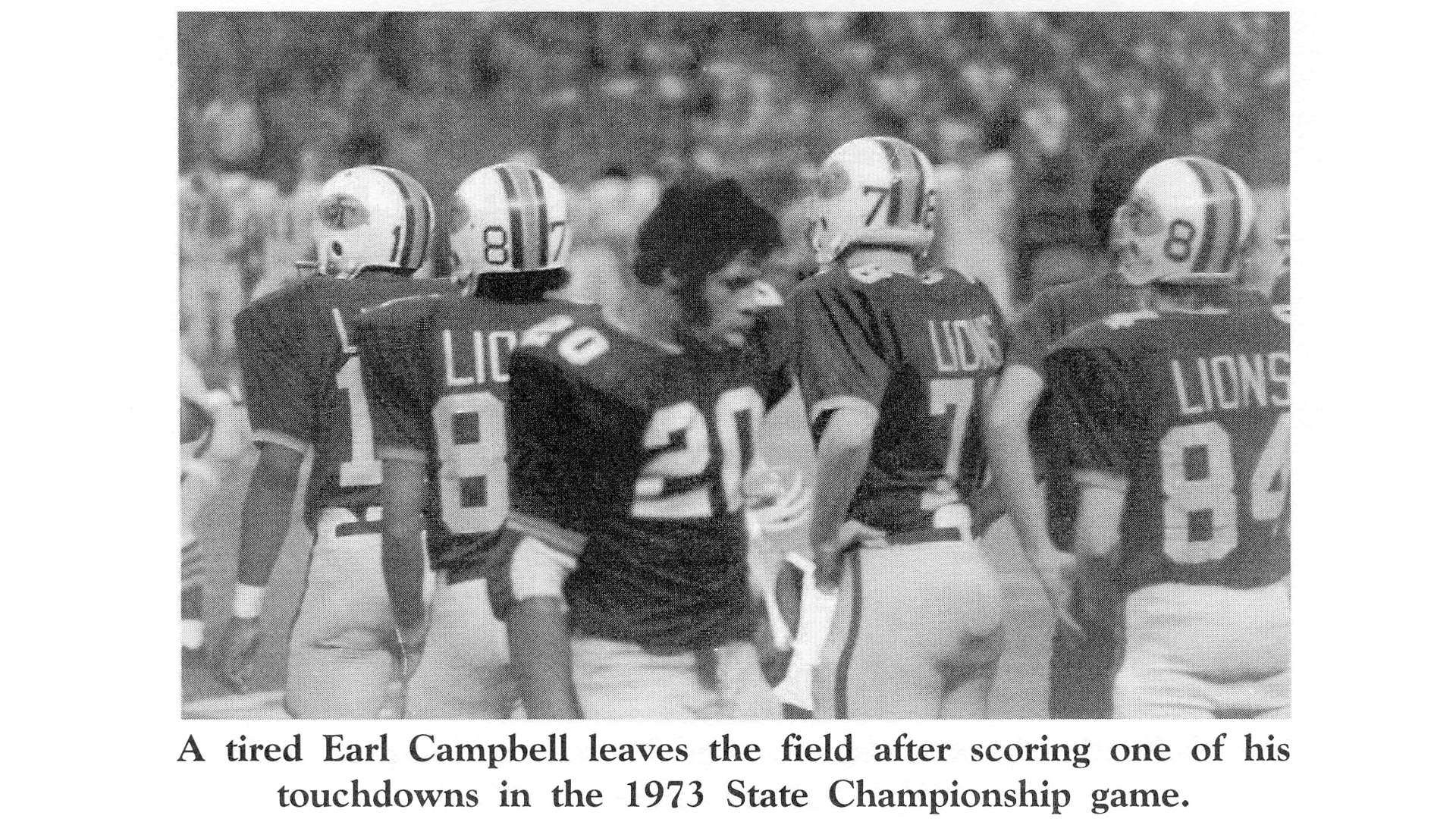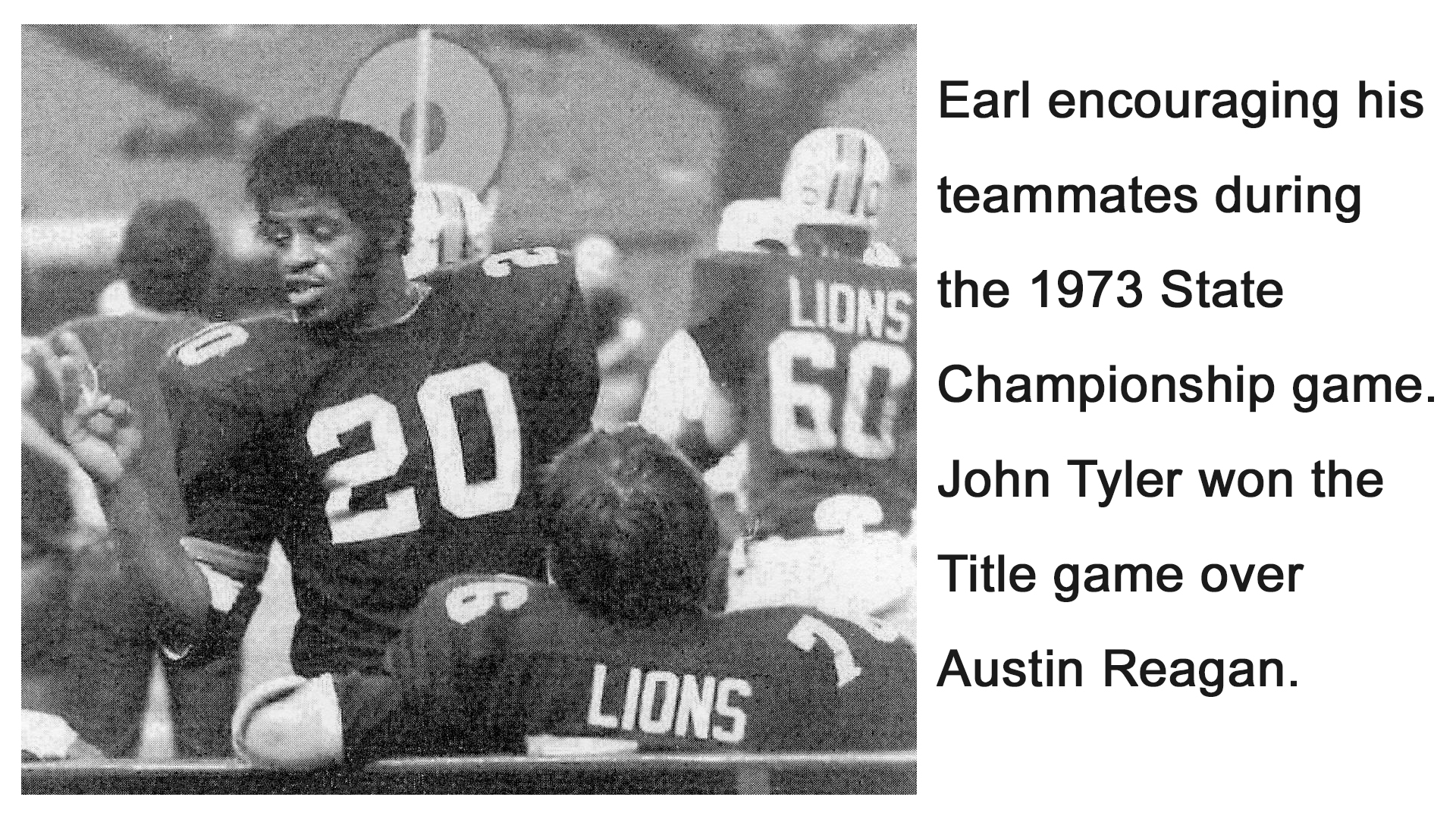Early Years
Born on March 29, 1955, to B.C. (Bert) and Ann Campbell, Earl Christian Campbell was the sixth of eleven children and was raised on three specific ideals: the undying importance of pride in oneself, love within the family and faith in God. Though he grew up during a time of prejudice and encountered many hardships of his own, Earl, drew strength and guidance from his family and many guardian angels to become one of the most influential and memorable athletes this nation has ever known.

During Earl’s childhood, the Campbell family faced significant financial hardships and B.C. Campbell had to work two jobs to support the family. By day, he would toil away in the rose fields under the hot Texas sun, and some of Earl’s earliest childhood memories are of working in the rose fields with his father. At night, after a short dinner with his family, B.C. would head off to his night job at a local K-Mart. From his father’s example, Earl quickly learned the importance of commitment and a strong work ethic.
Tragically, however, Earl was only eleven years old when his father passed away from a massive coronary. Earl’s mother, Ann, was left to lead her family in recovering from this emotional tragedy and had to help her children understand how a God they loved and trusted could take away their father. Although Ann assumed most of the family’s financial responsibilities, all of the children, including young Earl, were expected to assume new leadership roles within the family. Earl, however, was about to discover a new passion in his life that would eventually help him to cope with the losses and hardships he had already dealt with at such a young age.
He was already becoming one of the most dominating players of his time, with a devastating combination of determination, size and strength. Coaches and opponents also started to sense his leadership presence among other students on and off the field. This became increasingly important as Earl entered ninth grade at a newly de-segregated Moore Junior High.
During a very tumultuous time in this country, Earl came face to face with the hatred many whites had against blacks, especially those who excelled academically or athletically. The black and whites students were constantly at odds, but one man, Coach Lawrence La Croix, brought together the leaders of each group and unite the students toward a common goal: winning the football state championship for their future high school, John Tyler HS. After this meeting, Coach La Croix and Earl established a special connection. LaCroix became a role model and father figure to Earl. He taught Earl many things beyond the techniques of football: humility, grace, dependability and love for others.
It was also in ninth grade that Earl met another important person in his life, Reuna Smith. She caught his eye immediately and over the next several years she would become his best friend, high school sweetheart and also his wife. Earl knew right away that she was another guardian angel sent into Earl’s life to bless and guide him along the way.
Earl entered high school with words of encouragement from his junior high school mentor, Lawrence La Croix, still ringing loudly in his ears: “You will make a difference—both on the field and off.” But, unfortunately, it would take more than inspirational words to help Earl survive high school. Earl struggled academically and emotionally, due mainly to the fact that he deeply missed La Croix’s influence and guidance in his life, since he was still coaching at the junior high school.
With football season fast approaching, Earl felt distant from the sport that had directed and guided his life thus far. Reuna and his mother, Ann, noticed a change in the usually outgoing and playful young man. He was becoming more shy and reserved. Earl was a no-show for the first days of fall football practice, but at the urging of La Croix, he returned ready once again for competition. But, this time, he did not return to open arms.

First-year head football coach Corky Nelson knew nothing of Earl Campbell and the talent he had shown to so many in his junior high school days. Unimpressed by his attitude and absence from fall workouts, Nelson moved Earl to the “B” team, under the coaching direction of George Craddock. He played Earl at middle linebacker and running back and was astounded with his athletic ability. But Earl still felt a lack of passion for the game of football. Earl was eventually moved to the “A” team after an injury sidelined the team’s starting middle linebacker, and was named Newcomer of the Year after playing in only five games. But Earl still felt like something was missing. Then, once again, God stepped into Earl’s life at just the right time and sent a miracle. Coach Lawrence La Croix had been hired as an assistant coach at John Tyler. To this day, Earl swears the hiring of his favorite coach and mentor was part of a divine plan. Under the resumed guidance of La Croix, Earl was named an All-American middle linebacker that year, and the John Tyler Lions finished with an impressive record of 8-2, although just out of the playoff picture.
John Tyler opened the 1973 season with high expectations behind the leadership of Earl and his twin brothers Tim and Steve. A season opening 20-0 win against Greenville and never looked back. They finished the regular season undefeated, with a gratifying win over Tyler rival Robert E. Lee High School. With the Lee defeat in their rear-view mirror, Earl and the JT Lions went on to defeat Plano 24-7, an unbeaten squad from Conroe, an Arlington Heights team that featured Earl’s future Houston Oilers teammate, Mike Renfro, and an Arlington Sam Houston team 21-7. Earl and the Lions found themselves on their way to the state championship, where they would match up against a team from Earl’s future hometown, Austin Reagan, in a stadium that would be Earl’s future NFL stomping ground, the Houston Astrodome.

Earl rushed for over 200 yards that night and led his undefeated team to a state championship over Reagan 21-14. The John Tyler Lions had finally reached their goal of achieving Texas football greatness.

But unknown to he and his family, Earl’s powerful running and dominant presence on the field had attracted the attention of some of the most prominent collegiate recruiters, including the East Texas recruiter from the University of Texas, Ken Dabbs. It was at the state championship game where Dabbs brought legendary coach Darrell Royal to see Earl play in person and meet him for the first time. He was impressed with Earl’s stature, and he knew in that moment that he wanted Earl Campbell to be a Longhorn. The post-season brought Earl another All-American honor but this time at the running back position. In only his first season as the full time running back, Earl rushed for 2,224 yards, averaging 225 yards per game. But life after high school football also brought the confusing recruiting process into the lives of Earl and his mother, Ann. She already knew she did not want her “rock” going to college far from home. So Earl narrowed his choices down to Houston, Oklahoma, Baylor, Arkansas and the University of Texas.
At Coach Royal’s insistence, Dabbs spent 17 consecutive days at the Tyler Ramada Inn so he could focus his recruiting efforts on the most dominant running back in Texas, Earl Campbell. Dabbs practically lived with the Campbell family during this time, learning more about Earl’s personality, his family values, his work ethic and the many guardian angels that had become a part of his life, including Reuna, his mother and Coach La Croix and his wife Ann. But the day came when Coach Royal himself visited the Campbell home. Following on the heels of Oklahoma coach Barry Switzer’s home visit, in which Earl committed to a campus visit in Norman, Royal found himself very nervous about the meeting. Ann Campbell was also anxious about having such a well-known coach in her modest home. Due to the stress, she fell ill on the day of Royal’s arrival. Always cordial and courteous, however, Ann found the strength to welcome Royal in her home. She apologized for the appearance of her home. Putting her fears at ease, Royal told her a story about his childhood in rural Oklahoma where he grew up extremely poor. He also promised Ann that he would ensure the safety and well-being of her son while he was away at college. This, he promised, would be an excellent opportunity for Earl to not only succeed at football but would also give him a chance to walk away with a college degree from the University of Texas.
After Royal’s successful visit to Tyler and Earl’s exciting visit to Norman, he narrowed his choices down to those two schools: it would be Oklahoma vs. Texas. When he decided to officially visit UT, Raymond Clayborn, a future NFL defensive back, met Earl at the airport. Clayborn told him that he thought Earl had what it would take to win the Heisman trophy. But, ironically, Earl had never even heard of the Heisman trophy. He was so pleased with his visit that he decided to verbally commit to Texas on that trip.
But on the eve of national signing day, Earl was still confused about his decision. So he decided to do what he had been taught by his parents to do when he had a problem. He prayed, “God, if it’s your will that I should attend the University of Texas, then I’ll get up during the night to pee. If not, if I sleep through the night, then I’ll know your choice for me will be the University of Oklahoma.” Who would have ever imagined that the University of Texas would receive one of its finest recruits because of a little prayer and Earl’s bladder? Years later, when Barry Switzer heard how Earl made his final decision, he said, “If I’d of known that, I’d of flown to Tyler and laid underneath his bed all night!”
With that decision made, Earl now had to face the difficult task of saying goodbye to so many people who had always believed in him: his mother, his siblings, all of his coaches, including Coach La Croix, and of course, Reuna. But he would never forget the city that had accepted and supported him, despite the color of his skin and the amount of money he had in his pockets.
It was now time to move on to a new challenge. God had directed him this far, and Earl and his mother had faith He would continue to watch over him. But just in case, Ann issued a firm request to the man who she had established such a quick connection with, Ken Dabbs.
The day before Earl left for Austin, she said to Dabbs, “I just want you to know that I’m holdin’ you personally responsible for my Earl. While he’s there in Austin, you watch over my rock, and be sure no harm comes to him, and I’ll always be grateful that you came through on our agreement.”
